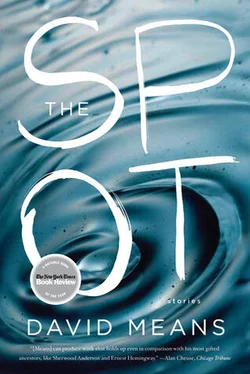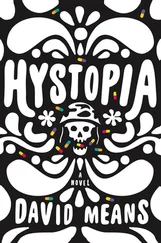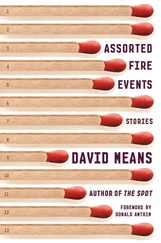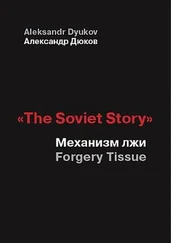From K.C. they wandered east again, skirting town centers while between them a tension formed. If the price were high enough, one man would rob the other if he could, if enough funds entered into the formula, Ronnie began to admit to himself. A structure had formed around this possibility of betrayal. A tightness entered the way they spoke to each other, wedged apart by the fact that even after the drinking binges, Ronnie was still youthful and the old man was still old. To go off alone would be to stretch the you-did-this-and-then-I-did-that fights they sometimes had, mostly in Indiana, a state too prim and proper and boring around the edges to exploit. In any case, the old man’s health was going downhill fast. At a free clinic in Indianapolis a doctor pressed the cold cone of his stethoscope to the caved rib bones and said, Breathe deep, deeper. Is that what you call breathing deep? When he slapped the X-ray film onto the light board in his office, it showed not shadow but rather ghostly white furls of tumor, billowing like smoke. In contrast, Ronnie remained limber and quick, fast on his toes, with lean skinny arms — only a few track marks and one hookshaped scar from a knife fight in Akron — and a brightness in his eyes that stayed on the edge of being hopeful. A spark still burned when he spoke about ideas he had on how to make a buck, heists he might pull if he could get his old buddies back together: a forlorn gas station, not far from the Ohio Turnpike, with a single attendant behind the counter, just begging to be stuck up, just asking for it when the time was right; a blueberry farm in Michigan that would yield up a month’s worth of sweet eating if you felt like heading up that way.
You got something to say on blades, the man named Vanboss said that night, outside Toledo. The silence had continued to open around the men, stretching down to the shore of the river and past that to the refinery, wagging its burn-off plume into the sky. It was a wide silence that spread out in concentric circles with Ronnie at the epicenter and the men just one ring out. It was the kind of silence that formed around a given, and the given was that Ronnie had a good blade story to tell, most likely a blade/fight story, and — this was pure speculation, but they sensed it was possible — even a terminal act of violence on Ronnie’s part, because he seemed the type: gaunt, tight-lipped about his past. He had uttered the name Hambone once or twice before going on to some other subject, as if testing to see who might’ve known the man.
Don’t have nothing to say on the matter of blades, Ronnie said, studying the flames, feeling his story tighten into something sharp. One last bit of trust the old man had handed over, in the form of how he had died and at whose hand that night. It was something he’d hold as long as he could, years hence, until he forgot most of the details and was moving through a vague sense of what had been. But for now he recalled the blade pushing harder against his throat, unwilling to budge no matter what he said up into the darkness. (Christ, I believe you. Your mother was one of a kind. She was wonderful.) Beneath the blade the hollow of his windpipe waited; an airy emptiness ready to form. A gape through which the rest of his life would pass. An obscene hole. The blade had not lightened up. It remained persistent and tight, sliding ever so slightly under the old man’s grip, nicking and digging until, in a single, quick movement, he lashed up, acting as fast as he could to save himself. Then the blade went in and out, moving before thoughts could form. It plunged between the brittle ribs and penetrated the cloudy center while the old man gave a loud, bellowing wheeze, tumbling back a few steps into the fire and, falling into a bloom of sparks, unleashing the scream that would spin around in Ronnie’s eardrums forever. It was a scream that would never leave the world, he thought, looking at the men who had stopped waiting for him to speak and were readying themselves — their faces taking on a bored slackness — to move on to some other subject.
The hot air in the sweat chamber — as the nurse had called it, ushering them in — was humidified to make it even more uncomfortable, and when he loosened his tie he was reminded that he was the type who felt it necessary to dress up for hospital visits, and for air flights, not so much because he had a residual primness left over from his Midwestern upbringing, which he did, but because he felt that he might receive more attentive service if he came dressed with a certain formality, so that the nurses and doctors tending his son might see him, Cavanaugh, as a bigshot banker instead of an assistant art director who was known, if he was known at all, for his last-minute design fixes. For example, he had once turned the interior of a hotel lobby — one of the last of the classic (now defunct) SROs in midtown, the Abe Lincoln, just off Twenty-eighth and Madison — into a Victorian salon by throwing a few bolts of velvet around the windows of the downstairs smoking lobby.
Just that morning, as he was leaving for the hospital, the director, Harrison, had called to let him know that he was being dropped from Draconian , a big-budget sci-fi production that included a huge political convention scene, filmed in an old dirigible hangar out on Long Island — a design job that had drawn upon his expertise in plastic sheeting, banners preprinted with mock structural details, and so forth. “It’s not that we don’t like your work,” Harrison had said. “You’ve got fine, visionary abilities. You see things others miss. But maybe you see too much. The problem with your design was — and I don’t know how to put this — it was too real, too clear. You know where I’m coming from? One wrong move cinematographically and you’re lost in the future, or lodged too far in the past. We made one wrong move, and I don’t want to make another. I’m not casting blame. I’m apportioning fault. If I don’t do it, the audience will. You see, my hope is to keep the film, for all its futuristic overtones, closely rooted in the present moment, and that way, as I see it, the audience will feel connected to contemporary experience in a way that will allow the obvious eternal elements”—Harrison was apparently referring to the assassination attempt, and to the corrupt, smooth-talking monomaniacal presidential candidate who was secretly implanting electronic doohickeys into his opponents’ temples in order to create a network of paranoid, deranged sap-souls, as he put it—“to resonate fully not only with current audiences but also with future audiences. So the trick to fostering believability lies in tweaking the extremely fine fissure between the known present and the unknowable future. If it’s tweaked correctly, even years from now an audience will ignore the errors and focus only on the viable world that had once really existed, and still exists, in all human interaction.”
Cavanaugh pondered all of the above — along with images from the drive that morning over the Tappan Zee Bridge and the beauty the river had held, stretching toward Tarrytown, rippled with tight wavelets, shimmering blue under a pristine sky — as he held his son, Gunner, in the sweat chamber, talked to him, got him settled, and gave him his toys, extracting them one at a time from an old green rucksack. These toys had been put aside for a few days so that they might accrue some elemental newness again and, in turn, give more in the way of pleasure. (“There are enough old toys to keep him busy,” Sharon had insisted. “I can’t charge another toy on the card, and I think we should build up his desire so that when Christmas comes there’s not another huge letdown like there was last year. Case in point: You bought him that Gobberblaster gun last summer, which was totally inappropriate for a kid his age and might’ve been a perfect gift for Christmas a couple of years from now, and he went out and shot it a few times, and now it’s in the back of the closet like all his other junked toys.”)
Читать дальше












